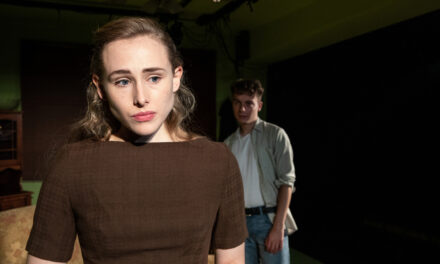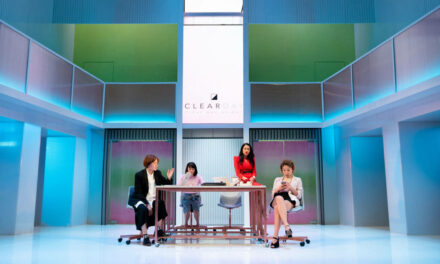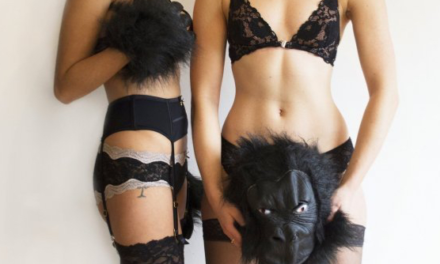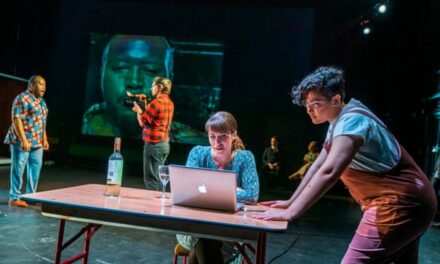It’s 2019 and we’re in purgatory. Some (many?) might say hell, considering the late capitalist nightmare and rise of right-wing extremism, but Gertrude, former Queen of Denmark, has assured us we’ve arrived in purgatory and will shortly be assigned to our own, personal patches of dusty, red rock.
Debs Newbold is Gertrude, the effusive, singular welcoming committee for new arrivals – the audience. After waking from a tormented nap, she gives us the basics of the place and that soon we’ll be bussed to our respective swathes of dry, volcanic land. Until then, we must wait – it’s good practice for dealing with our futures in this place, anyway. For the next 90 minutes, she cheerily accounts the day-to-day happenings on this endlessly stretching landscape, complete with chatter about jigsaw puzzles, daily flower deliveries from Sigmund (Freud), and visits from her mate, Joan (of Arc). These and other anecdotes are delivered with good comic timing and accompanied by an onstage percussionist, Luke Harney.
Much of this material, though amusing, is fluffy padding that isn’t dramaturgically needed to support the core of Gertrude’s life story – when she comes to her son Hamlet, her first husband Old Hamlet and second husband Claudius, and Ophelia. It’s in these sections where we see the real woman that Shakespeare has kept on the periphery of his play. We learn about her arranged marriage at age 14 to the 40-year-old Hamlet, her love of Claudius, her hopes for her son, and the moments of joy she has when she can be alone. As a woman and a queen, nothing belonged to her – including her body and her time. These short almost-stories are brief, only make up about half of the show and some could use fleshing out, but they are by far the best and the build-up to them would be more effective if it was shorter.
This is the first proper outing for this show, so its staging is minimal and its improvised script needs work, but there are some sections that are gems – her memories of Ophelia particularly resonate. Trimming the chaff and adding more granular detail to her recollections will make this a much more powerful work with much to say about being a woman in the world, both past, and present.
This article was originally published in The Play’s The Thing on May 31, 2019, and has been republished with permission.
This post was written by the author in their personal capacity.The opinions expressed in this article are the author’s own and do not reflect the view of The Theatre Times, their staff or collaborators.
This post was written by Laura Kressly.
The views expressed here belong to the author and do not necessarily reflect our views and opinions.


















